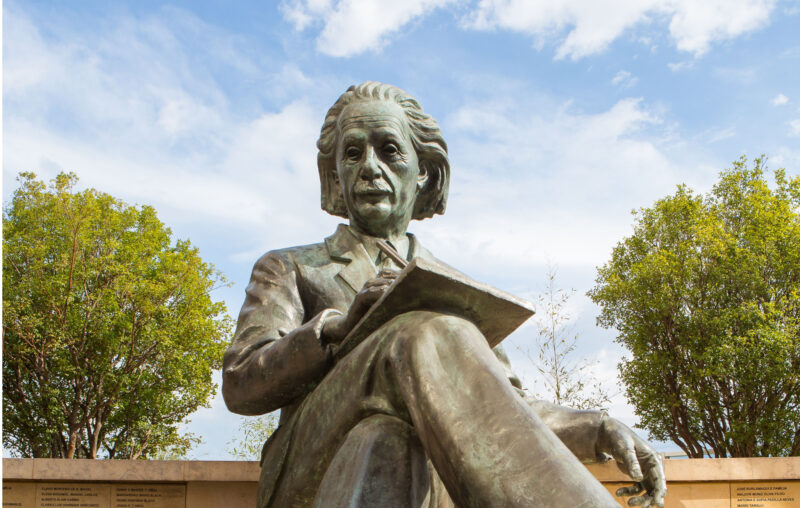You’re No Einstein, Einstein

In a 1949 essay, Albert Einstein asked an important question:
“Is it advisable for one who is not an expert on economic and social issues to express views on the subject of socialism?”
If he had said “no,” it would have been an admirably concise and accurate essay. Instead, he wrote, “I believe for a number of reasons that it is,” and went on to come out squarely for socialist central planning and against the “economic anarchy of capitalist society,” which he perceived as “the real source of evil.”
He was wrong. It was not advisable for him to weigh in on an important issue on which he lacked expertise. In fact, it was quite inadvisable to do so, and even unethical, a form of intellectual malpractice, considering the massive harm caused by socialism and the incredible upsurge in human well-being produced by capitalism.
How could someone so brilliant be so wrong? Einstein’s genius wasn’t just a product of his impressive intelligence, but also of intensive effort. He was, of course, a true expert in physics, deeply conversant in the ideas of the field, because he had studied it so diligently. Not having put in a similar effort in economics, he was far less conversant in it, not a genius, but a mere dilettante.
But in doing the inadvisable, he provided us with a useful case study. Why should very smart people with undoubted expertise in one discipline be wary of expressing their views confidently in other disciplines? Why should all of us view their pronouncements with great skepticism when they make them? Because outside of physics, even Einstein was no Einstein.
On the whole, Einstein shows a very superficial perspective on the issues of economics and structuring a socialist government, and he fails to write with anything like the clarity and precision demanded in physics.
For example, being captivated by Thorstein Veblen, he considers capitalism to be part of the “‘predatory phase’ of human development,” because it consists of “a huge community of producers the members of which are unceasingly striving to deprive each other of the fruits of their collective labor.” While it’s clear Einstein hates economic competition, it’s not clear what he means by that phrase, and nothing that follows clarifies it.
What is clear is that he makes the common socialist mistake of dividing the economy only into capitalist owners and proletarian employees. By leaving out of his model the consumer–the very purpose of the capitalist system’s existence–he is unable to see that the competition he hates so much is actually a contest among producers to see who can make the best offer to consumers who are free to pick and choose between them. Amazingly, this genius lived in what remains one of the greatest eras of human history from the consumer perspective, when they gained electric light, radios, refrigerators, automobiles, and motion pictures, and could only see predation in that system, remaining actively hostile to the processes that so greatly enriched the average person’s life.
His lack of expertise is also on display in multiple ways in his discussion of labor. First, complaining about how wages are determined he wrote “even in theory the payment of the worker is not determined by the value of his product.” But the theory that wages are determined by a worker’s marginal productivity is an idea that was developed in the late 18th century, more than half a century before this essay was published.
He also complained that “Unlimited competition leads to a huge waste of labor.” Again, lack of precision obscures his meaning, but in the same paragraph he stated that capitalism has no provision for ensuring work for all those willing and able to work, so that an “army of unemployed” almost always exists. This suggests that he sees unused labor as wasted.
But this is nonsense. Labor is a resource, and unused resources are not “wasted,” if there is no present demand for them. Instead, it is a waste to use resources unnecessarily, which would entail a cost greater than the benefit.
Einstein seems to have felt free to avoid the trouble of gaining economic knowledge because he saw it as limited to understanding the “predatory phase of human development,” while the purpose of socialism was to “overcome and advance beyond” that state. Therefore, he said, “economic science in its present state can throw little light on the socialist society of the future” But how he could know the limits of the economic sciences without actually knowing the economic sciences in any depth appears to be a question he never considered.
Ultimately, though, Einstein himself was unable to throw much light on socialist society, in part due to his lack of economic knowledge. He failed, for example, to address the single most critical economic challenge to central planning: how to determine the most efficient use of resources. Although, given the state of the economics discipline at the time, he could have intelligently gotten this wrong, there’s no indication that he was even aware that the issue was a subject of debate among contemporary economists.
He did, at least, identify the two most crucial political questions about socialism. In the most insightful paragraph of the essay, he appropriately expressed concern that central planning could entail “the complete enslavement of the individual,” and asked:
- “[H]ow is it possible, in view of the far-reaching centralization of political and economic power, to prevent bureaucracy from becoming all-powerful and overweening?“
- “How can the rights of the individual be protected and therewith a democratic counterweight to the power of bureaucracy be assured?”
Einstein called these “extremely difficult socio-political problems,” but he failed to provide any analysis of them, instead moving immediately to conclude the essay before he got bogged down in their complexities. Here again, subject matter knowledge might have helped. While he does seem to have intuited that socialism increased the dangers of authoritarian government, he doesn’t seem to have fully grasped that what he sought were two goals in fundamental tension: a more powerful yet more controlled government, nor that throughout human history the two have never been reconciled.
In addition to political science knowledge, economic knowledge applies here, because Einstein might have recognized the all-encompassing scope of economic decision-making, which is inevitably so extensive that almost nothing other than an individual’s unspoken thoughts lies outside the planner’s purview.
Consider education, to which Einsten devoted considerable attention in this essay. Socialism, he argued, requires an education system “oriented toward social goals.” Einstein surely understood that a good educational system promotes dissenting views, so the promotion of dissent could itself be understood as a social goal, but that doesn’t mean any particular dissenting idea will be seen by those in authority as socially desirable. So the planners, as they determine what courses of study can be offered, what books can be published, and which scholars will be funded, must make decisions about which dissenting ideas are worthy of funding, and which must be starved of resources.
The same problem exists for the media. Einstein claimed that capitalist control over the media makes it “extremely difficult . . . for the individual citizen to come to objective conclusions.” How it does so is not specified, so it’s not clear how socialism can improve on it. Planners cannot avoid making decisions about what resources to devote to the media, so they will determine how many news sources there will be. Is it economically rational–from a central planner’s perspective–to have multiple competing news sources when it only takes one to present the truth that citizens need to come to objective conclusions?
Clearly, any system where planners control the distribution of resources used for education and the media is not a system that can readily support independent political thought. This is the case even if planners do not consciously intend to limit the realm of acceptable ideas because they have no choice but to make choices in their allocation of resources. But is it even possible for planners to try to be neutral in their support for different ideas? Can they in good conscience allocate resources to anti-social ideas, that is, to ideas that attack the very idea of central planning? In contrast, it has been evident since at least Friedrich Engels’ day that some capitalists, and of course many of the workers in a capitalist society, have no qualms about advocating the overthrow of capitalism; it is inevitably a better system for promoting freedom of thought simply because the decentralization of resources makes it so much harder to prevent their expenditures on anti-system ideas.
So how wrong was Einstein? So wrong that he promoted a system that posed a greater threat to his cherished value of independent thought. So wrong that he advocated for a system that in every instance it’s been tried–whether in whole or in part–has harmed the public by making them poorer, sometimes even destitute.
The important lesson here is not simply that Einstein was wrong. It is that genius does not automatically transfer across disciplines. However intelligent a scholar is, however accomplished in one discipline, his knowledge in another field is dependent not on his intelligence or prior accomplishments, but on his depth of study in that other field. So whatever temptations geniuses may feel to make pronouncements about that other field, they should resist. And whatever temptation others may have to listen to such pronouncements, they should also resist.
In short, contra Einstein, it is never advisable to speak in ignorance.










